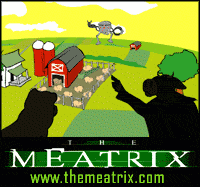Home
 Articles
Articles
 Sustainable News
Sustainable News
Victory Gardens, Again
by Meg McGowan
Conscious Choice, May 1998
"Grow your living. It may not be available for you to buy," declared a
wartime booklet from International Harvester entitled Have a Victory Garden.
More than 50 years later, Chris Eller, director of the Master Gardener Program
at the University of Illinois Cooperative Extension Service (CES) voices similar
concerns. She, too, is worried about Americans' ability to feed themselves,
specifically Chicago residents who are losing and will continue to lose food
stamps as a result of recent welfare reform measures. Eller, at the North
Chicago office of the U. of I. CES, is heading up a team effort fronted by
the Chicago Master Gardeners to educate city residents about growing their own
food as a viable alternative. In conjunction with a number of other Chicago-area
organizations that make up GreenNet, she is coordinating a program of
sustainable/organic agriculture techniques that will benefit the neophyte
urban gardener. Some of the techniques such as crop rotation, fall soil
preparation, planting cover crops, mulching, trellising, and succession
planting harken back to the war gardens of the '40s.
"This year we are planting trial gardens at the homes of several volunteers,"
says Eller. "We are developing fact sheets on sustainable agriculture and are
currently planning workshops, and demonstration gardens at various sites
throughout the city." Another possibility is a mentor program, where Master
Gardeners would be available to actually provide on-site information. In May,
one of the educational tracks at the Green & Growing fair will be
Environmental/Habitat Gardening, featuring a two- part seminar entitled
"In Partnership with Mother Nature: Ideas for Building Your Sustainable Garden."
Integrated pest management, worm composting, garden rain barrels, and plants
that feed the soil will be discussed. Blooming Branches Garden Program,
presented in conjunction with the Chicago Botanic Garden and the Chicago
Public Libraries, offers urban gardening information to both adults and
children on an on-going basis. Topics include gardening in limited space,
vegetable gardening, and seed starting and transplanting. By next year Eller
hopes to incorporate information currently being assembled into the Blooming
Branches program.
Not all of this is new, of course. "Many of these techniques have been taught
for years," Eller points out. "Part of what is new is that we're trying to gather
together these scattered seeds of knowledge, and to integrate what we now know
and teach with what we are learning about organic and sustainable gardening techniques."
Seeing the current trend of utilizing city space for food production in a
historical context invites comparisons between the war we were engaged in then
and the wars we are fighting today -- against poverty, alienation, and the
ultimate destruction of our source of life itself, the land. The concept of a
Victory garden is grander than that, however. The term speaks of reunion and
rejoicing. It speaks of personal triumph that is possible through cooperation
of people and the earth. We need not undertake violent efforts in order to
experience victory. All we have to do can be summed up by Voltaire, who wrote
at the end of Candide, "We must cultivate our garden."
|





